Gopal reviews Bhaskaranand Jha Bhaskar’s Two Indias and Other Poems. An exclusive for Different Truths.
Book: Two Indias and Other Poems
Author: Bhaskaranand Jha Bhaskar
Authorspress, New Delhi, INR-295/-
ISBN:978-93-89110-44-9
Some readers may argue that concentrated meaning should be the aim of the poet, that this intensity made poetry a separate and valuable thing. ‘Two Indias and Other Poems’ assembles eighty intense, contemporary, inimitably delightful poems of Bhaskaranand Jha Bhaskar, probing the disorder and malady of life, of the motherland along with an enlightening Foreword by U Atreya Sarma.
Most of his poems are not heavy or difficult but they are bold, vocal, assertive and clear-eyed. They take on the important themes – nature, conflict, grief, regret, politics, ideals– and speak to us of anguish and loss, of uncertainty, of ideals and fight against indifference.
Most of his poems are not heavy or difficult but they are bold, vocal, assertive and clear-eyed. They take on the important themes – nature, conflict, grief, regret, politics, ideals– and speak to us of anguish and loss, of uncertainty, of ideals and fight against indifference. Readers are drawn into his poems by their quality of confiding intimacy and rare brevity.
In his poems, the passions, epitomes, and disenchantments of life are brilliantly and poignantly depicted. The poet fuses the natural and tangible realms with skill and purpose. The poet treats the poems like a canvas, filling it with layers of careful detail; constricted, sparkling lines and kinetic wordplay.
What the poet hopes for in this expansive remarkable volume, is the capability to see his country, India in general and universe as a whole. Sometimes he takes a wide-angle lens to our complex life and its attendant anxieties. His poems which are built of unadorned language and accessible imagery, have an elevating mosaic.
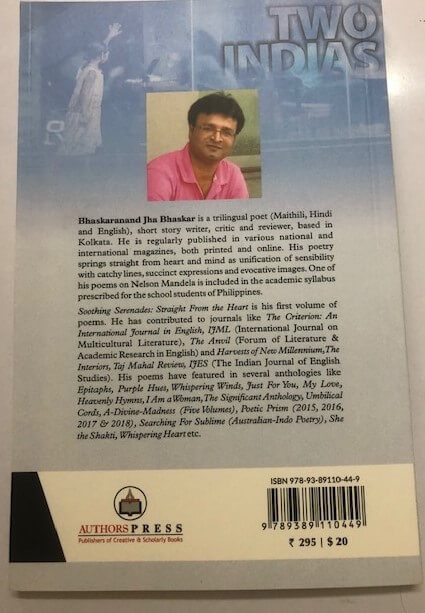
What the poet hopes for in this expansive remarkable volume, is the capability to see his country, India in general and universe as a whole. Sometimes he takes a wide-angle lens to our complex life and its attendant anxieties. His poems which are built of unadorned language and accessible imagery, have an elevating mosaic. In one poem, Bhaskaranand proclaims,
Oh! Delhi! Why don’t you
Cure them with the medication of spirituality
And make them drink syrup of ethical values
That your glory has been using since long,
To treat all the global rotten malaise? ‘(Oh! Delhi)
U Atreya Sarma, an eminent poet, writer and editor has rightly pointed out, ‘Inspired by an overreaching ethos, Bhaskar does not exclude the beauties of nature, gods and festivals and national heroes for his singing. His heart cries out for the penurious, neglected and downtrodden.’
U Atreya Sarma, an eminent poet, writer and editor has rightly pointed out, ‘Inspired by an overreaching ethos, Bhaskar does not exclude the beauties of nature, gods and festivals and national heroes for his singing. His heart cries out for the penurious, neglected and downtrodden.’
The poet is of the firm opinion that it’s still possible to heal what’s barren or damaged and that maybe it will be richer, more joyful, and more possible than we imagine if we can only just begin to work out the solutions in a seamless manner. This stylish and propulsive poem explores the naked voice echoing inside.
‘Mother takes care
Of all;
Now time for us
To nurse to heal her-
The ailing Earth.’ (Heal the Ailing Earth)
The poet has clearly mentioned, ‘India being a background and metaphor for external and internal realities.’ He speaks of pain, shame and fear with sometimes a startling vulnerability. Some of the poems trace the traumas and the crisis of the commoners and gives a not-always-comforting glimpse of how their lives have played out afterwards.
The poet has clearly mentioned, ‘India being a background and metaphor for external and internal realities.’ He speaks of pain, shame and fear with sometimes a startling vulnerability. Some of the poems trace the traumas and the crisis of the commoners and gives a not-always-comforting glimpse of how their lives have played out afterwards.
Sorry state of affairs!
Where human chains get loose or broken
By iron or golden rods of high handedness
Pathetic! Apartheid rules the roost. (Mass Exodus; Back and Forth)
The collection is meant as a narrative depicting the concern of the socio-political and national-transnational concerns of contemporary times and a reckoning of sorts – the poet tells us this – but the poems have everything we expect from him: lightness of touch, bold expressions, refreshing thoughts, clarity and precision. A strand of compassion runs through them especially in his poems dedicated to Mithila. They are a joy to read.
‘With cultural ethos of Mithila
Everywhere like a shiny pearl;
Let us shun stern chauvinism
The flag of our glory to unfurl.
For a prideful head to the fore
Let ‘all be Maithili’s to the core.’ (Resurgent Mithila)
Poetry is actually making a story out of a moment and the poet can empty that moment in many different forms and ways. What is remarkable about this collection is the evacuating of imageries and thoughts. It becomes an experiment with absence – an investigation of what happens when you go missing your identity.
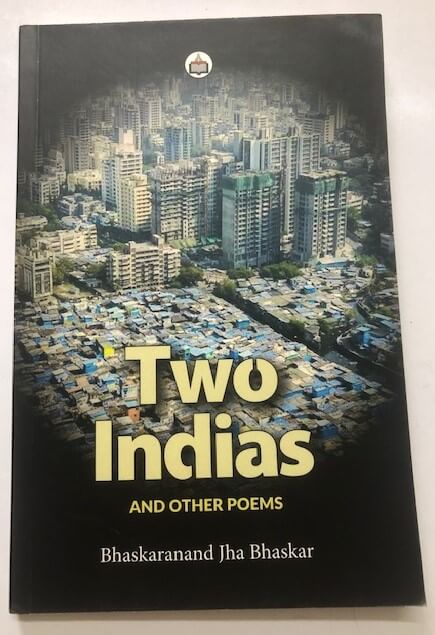
Poetry is actually making a story out of a moment and the poet can empty that moment in many different forms and ways. What is remarkable about this collection is the evacuating of imageries and thoughts. It becomes an experiment with absence – an investigation of what happens when you go missing your identity. The poet makes apocalypse real and graphic.
‘Trauma and agonising pain inside
Their lifeline is quite akin
To that of the cities or of rest
Of the people, huddled
For they know how to live their life
For they know how to live their life
Even in the face of death
Always hovering around them.’ (Rugged Refugee)
It is not the most obvious of escapes but the poet finds refuge in words and language as his mind expresses anguish at the disparity and inequities of life. It is the permeability of Jha’s writing that astonishes: dishonesty, violent incident, and terror – all absorbed into the text in lush musical lines.
‘The skeletons of the destitute
are hung,
stinking out shame
for all those
badly lost
in sumptuous spree; (Freedom is Chained)’.
Jha’s poem pulls off a weird act, exploring the real-life while staying painfully alive. He writes rather conventional verse in English and poems of astonishing freshness. Clarity and lucidity are his bywords; his voice is soaked with political malaise.
Jha’s poem pulls off a weird act, exploring the real-life while staying painfully alive. He writes rather conventional verse in English and poems of astonishing freshness. Clarity and lucidity are his bywords; his voice is soaked with political malaise.
Once again
From the country,
Law and order situation
To be pushed at their nadir,
For dates are out
For democratic survival
Of the biggest political humbugs… (Poll Dates)
Or
On long mast of the power
The flag was hung once again
To be hanged bit by bit later. (Republic)
The poet excels in adopting the conventional form- its imagery, its language- makes it his own. He is in search of cosmic balance and urge all of us to ‘Unite together/Against the evil forces of nature’. His lush language invites us into the exquisite metaphorical surrounds — or beyond that ‘orgasmic pleasure of life’ ‘in the enraptured moments.’
First, fast and fittest
Countless sperms crawl in the ovum
Of the pregnant platform;’ (Railway Platform)
Furthermore, the poet’s world play is intriguing and alliterative assumption is striking at times. The poet is delving deep into the bottom of the heart that seeks new and revealing perspectives on the appalling human condition. It’s true that the splendour of his language is as much a matter of sound as of meaning and often reflects as a crafty mix between articulation, satire and stand up.
Furthermore, the poet’s world play is intriguing and alliterative assumption is striking at times. The poet is delving deep into the bottom of the heart that seeks new and revealing perspectives on the appalling human condition. It’s true that the splendour of his language is as much a matter of sound as of meaning and often reflects as a crafty mix between articulation, satire and stand up.
‘Tired tricolours
Amidst clarion salutes
Unfurl writhing wreaths of wrath. (Unfurling Wreaths of Wrath)
This book conveys profound physical presences: connection to people and earth, a deepest need for embodied contact in this often complex and contorted modern world. In the following poem, the tone is calm and nuanced. The poet has also added that the poem ‘deals with the eternal classical theme of longing and consummation’ and the result is these intense perceptions.
‘A world in itself floats
In serene silence and tranquillity
While the boat dances
Down the crimson horizon.’ (Boat in the Krishna River).
Poetry often asks us just to focus and think and be meditative. Jha’s poetry is fresh and exuberant yet flags injustice and inequality at every turn. It may, at times, feel verbose but its ultimate effect is one of deep humanity.
Poetry often asks us just to focus and think and be meditative. Jha’s poetry is fresh and exuberant yet flags injustice and inequality at every turn. It may, at times, feel verbose but its ultimate effect is one of deep humanity. His poems are written with clarity and political incision and often sound like outward exchange than private confession.
The cover page design is apposite. And surely, to read this book is actually to accompany the poet on his journey through the mazes of life.
Photos sourced by the author

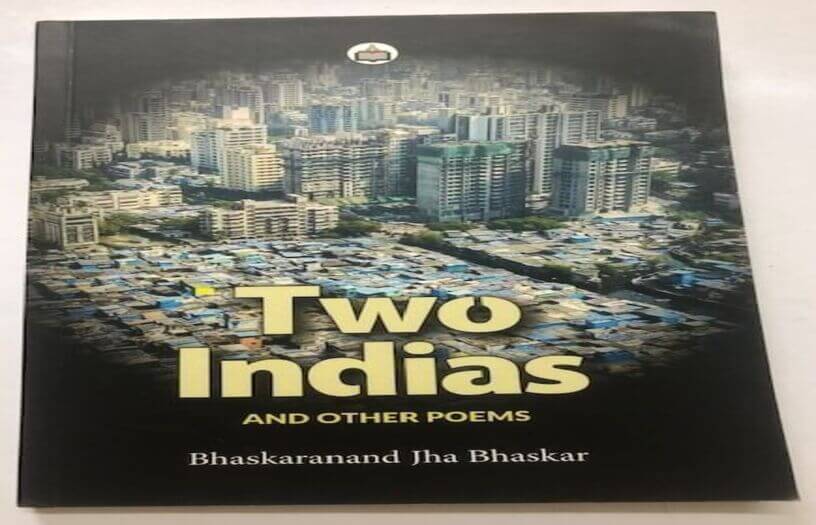
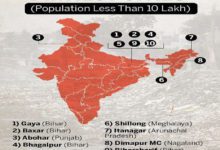

 By
By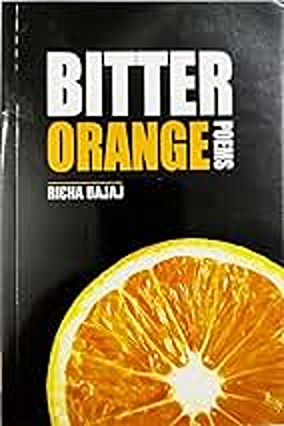
 By
By
 By
By
 By
By